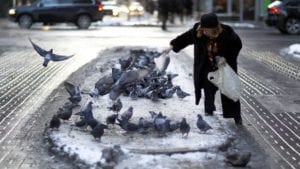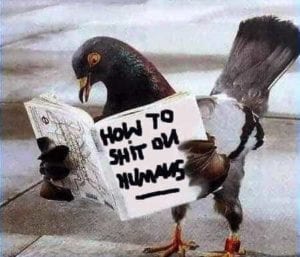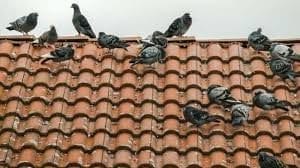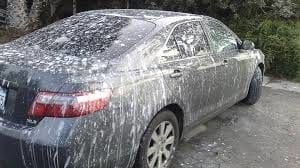
by Pigeon Patrol | Feb 5, 2020 | Animal Deterrent Products, Bird Spike, Pigeon Control, Pigeon Droppings, Pigeon Patrol's Services, Pigeon Spikes
A rare virus that can be contracted by humans has killed a large number of Victorian pigeons after being detected in Australia for the first time.

A type of avian paramyxovirus has resulted in the deaths of a number of hobby pigeon flocks.
Australian chief veterinary officer Dr Mark Schipp said the birds had died suddenly in large numbers.
The birds had sometimes appeared tired or shown neurological signs such as circling or head flicking before death.
He said human infection was extremely rare and usually occurred after contact with an infected bird.
“The rare virus causes only mild, short-term conjunctivitis or influenza-like symptoms [in humans],’’ Dr Schipp said.
“State veterinary authorities have been asked to review the health of their pigeon and poultry flocks.
“At this stage, there are no reports of this virus causing disease in wild birds, but we have asked the Australian Wildlife Health Network to be alert to this possibility.’’
Dr Schipp said the national Consultative Committee on Emergency Animal Disease had met twice to discuss the outbreak, which is being managed by Victorian chief veterinary officer Dr Hugh Millar and industry and veterinary authorities.
Dr Schipp said the consultative committee has agreed to investigating pigeon and other bird holdings where disease is suspected and to quarantine affected properties.
Anyone concerned about their pigeons or birds should contact an experienced poultry veterinarian, their local department of agriculture, or the Emergency Animal Disease Watch hotline on 1800 675 888.
Source
At Pigeon Patrol, we manufacture and offer a variety of bird deterrents, ranging from Ultra-flex Bird Spikes with UV protection, Bird Netting, 4-S Gel and the best Ultrasonic and audible sound devices on the market today.
Contact us at 1- 877– 4– NO-BIRD, (604) 585-9279 or visit our website at www.pigeonpatrol.ca
Bird Gone, Pigeon Gone, Seagull Gone, Pigeon issue, pigeon spikes, 1-877-4NO-BIRD, 4-S Gel, Bird Control, Pigeon Control, bird repellent, Bird Spikes, sonic bird repellent, stainless steel bird spikes, bird spikes Vancouver, Ultra Sonic Bird Control, Bird Netting, Plastic Bird Spikes, Canada bird spike deterrents, Pigeon Pests, B Gone Pigeon, Pigeon Patrol, pest controller, pest control operator, pest control technician, Pigeon Control Products, humane pigeon spikes, pigeon deterrents, pigeon traps, Pigeon repellents, Sound & Laser Deterrents, wildlife control, raccoon, skunk, squirrel deterrent, De-Fence Spikes, Dragons Den, Canada bird spikes, Canada pigeon, pigeon control, pigeon patrol, pigeon. Kill pigeons, crow, starling

by Pigeon Patrol | Feb 5, 2020 | Animal Deterrent Products, Bird Netting, Bird Spike, Pigeon Droppings, Pigeon Spikes, Pigeons in the News, UltraSonic Bird Control
Sampling of pigeons captured on the streets of Madrid has revealed the bacterial pathogens they carry. Researchers writing in BioMed Central’s open access journal Acta Veterinaria Scandinavica found two bugs that were highly prevalent in the bird population, Chlamydophila psittaci and Campylobacter jejuni, both of which cause illness in humans carried by pigeons.
Fernando Esperón from the Animal Health Research Center, Madrid, Spain, worked with a team of researchers to analyse blood and enema samples taken from 118 pigeons caught using gun-propelled nets.
He said, “The present study demonstrates the extremely high prevalence of two zoonotic pathogens in feral pigeons in Madrid. At the same time, infection with these pathogens did not appear to be associated with any harmful clinical signs in the birds themselves. This leads to the hypothesis that pigeons act as asymptomatic reservoirs of Chlamydophila psittaci and Campylobacter jejuni. These birds may therefore pose a public health risk to the human population.”
Chlamydophila psittaci was found in 52.6% of the carried by pigeons captured, while Campylobacter jejuni was present in 69.1%. Although there have been few reports of disease transmission between pigeons and humans, it can occur by aerosols, direct contact or indirect contact through food and water contamination.
According to Esperón, “Thermophilic Campylobacter species are considered the primary pathogens responsible for acute diarrhea in the world. In fact, in many countries such as England and Wales, Canada, Australia and New Zealand Campylobacter jejuni infection causes more cases of acute diarrhea than infection by Salmonella species.”
Source
At Pigeon Patrol, we manufacture and offer a variety of bird deterrents, ranging from Ultra-flex Bird Spikes with UV protection, Bird Netting, 4-S Gel and the best Ultrasonic and audible sound devices on the market today.
Contact us at 1- 877– 4– NO-BIRD, (604) 585-9279 or visit our website at www.pigeonpatrol.ca
Bird Gone, Pigeon Gone, Seagull Gone, Pigeon issue, pigeon spikes, 1-877-4NO-BIRD, 4-S Gel, Bird Control, Pigeon Control, bird repellent, Bird Spikes, sonic bird repellent, stainless steel bird spikes, bird spikes Vancouver, Ultra Sonic Bird Control, Bird Netting, Plastic Bird Spikes, Canada bird spike deterrents, Pigeon Pests, B Gone Pigeon, Pigeon Patrol, pest controller, pest control operator, pest control technician, Pigeon Control Products, humane pigeon spikes, pigeon deterrents, pigeon traps, Pigeon repellents, Sound & Laser Deterrents, wildlife control, raccoon, skunk, squirrel deterrent, De-Fence Spikes, Dragons Den, Canada bird spikes, Canada pigeon, pigeon control, pigeon patrol, pigeon. Kill pigeons, crow, starling

by Pigeon Patrol | Jan 31, 2020 | 4-S Gel Bird repellent, Animal Deterrent Products, Bird Spike, Pigeon Control, Pigeon Droppings, Pigeon Patrol's Services, Pigeon Spikes, Pigeons in the News, UltraSonic Bird Control
 Now that the weather is getting warmer, I’d like to open my windows and get some fresh air in my apartment. The windows and building are filthy grimy and covered with pigeon poop problem on the outside. The ledge and the side of the building are too. If I open the window the soot all blows into our apartment and I don’t even want to know what diseases could come from the poop. Are landlords required to wash the facade of a building? What about windows? I can still see out of them, but just barely. And if a landlord is required to do this, how can I get mine to do it? Our landlord does the bare minimum to maintain our building.
Now that the weather is getting warmer, I’d like to open my windows and get some fresh air in my apartment. The windows and building are filthy grimy and covered with pigeon poop problem on the outside. The ledge and the side of the building are too. If I open the window the soot all blows into our apartment and I don’t even want to know what diseases could come from the poop. Are landlords required to wash the facade of a building? What about windows? I can still see out of them, but just barely. And if a landlord is required to do this, how can I get mine to do it? Our landlord does the bare minimum to maintain our building.
My friend, Emma, is two and a half years old. She’s a big girl now and doesn’t need a diaper. But three or four months ago she could fill a diaper as well as any 6’5″ sailor who ate all the beans in the galley. I’m talking arm pits to knees! Where does it all come from? It’s as if small children are packed with adult-sized digestive systems. Same with pigeons; they generate a remarkable volume of poop given their size. Maybe it’s because they will eat anything, including the bodies of their fallen comrades.
Everyone who lives in a city has a pigeon story. I used to drive an MG convertible. I remember waiting at a stop light on Division Street. I happened to look up and from the steel girder above I noticed a pigeon’s ass maneuvering to drop a bomb. I couldn’t go anywhere! I ended up with what seemed to be a bucket load of shit running down the back of my shirt. Needless to say, I don’t believe any of wives’ tales about pigeon poop bringing good luck.
In fact pigeon poop is dangerous. There are several diseases associated with p-scat. Pigeons are the subjects of eradication programs throughout the world’s large cities.
In San Francisco, we have laws prohibiting the feeding of pigeons. The San Francisco Department of Public Health has a program devoted to dealing with pigeons and their excrement. If you have already complained to the landlord about the problem in writing and he has done nothing, call them.
I am not aware of any specific legal requirement for landlords to wash windows or facades of their buildings. But I’m willing to bet that there are other issues with the building and your apartment, given the lack of maintenance. Take a look around and check to see if there is peeling paint; windows that won’t open (sealed shut with shit?); cracks in the walls; leaks; other safety hazards, etc. If you believe there are violations, inform the landlord in writing. Again, if he doesn’t respond, call a Housing Inspector with the Department of Building Inspection, make a complaint and arrange for an inspection for this pigeon poop problem.
If the landlord tells you there is nothing he can do, maybe he needs a diaper.
Post From: Tenant Lawyers
At Pigeon Patrol, we manufacture and offer a variety of bird deterrents, ranging from Ultra-flex Bird Spikes with UV protection, Bird Netting, 4-S Gel and the best Ultrasonic and audible sound devices on the market today.
Contact us at 1- 877– 4– NO-BIRD, (604) 585-9279 or visit our website at www.pigeonpatrol.ca
Bird Gone, Pigeon Gone, Seagull Gone, Pigeon issue, pigeon spikes, 1-877-4NO-BIRD, 4-S Gel, Bird Control, Pigeon Control, bird repellent, Bird Spikes, sonic bird repellent, stainless steel bird spikes, bird spikes Vancouver, Ultra Sonic Bird Control, Bird Netting, Plastic Bird Spikes, Canada bird spike deterrents, Pigeon Pests, B Gone Pigeon, Pigeon Patrol, pest controller, pest control operator, pest control technician, Pigeon Control Products, humane pigeon spikes, pigeon deterrents, pigeon traps, Pigeon repellents, Sound & Laser Deterrents, wildlife control, raccoon, skunk, squirrel deterrent, De-Fence Spikes, Dragons Den, Canada bird spikes, Canada pigeon, pigeon control, pigeon patrol, pigeon. Kill pigeons, crow, starling

by Pigeon Patrol | Jan 31, 2020 | 4-S Gel Bird repellent, Animal Deterrent Products, Bird Deterrent Products, Bird Spike, Bird Spikes, Pigeon Control, Pigeon Patrol's Services, Pigeon Spikes, UltraSonic Bird Control
Pigeons are as integral to city living as traffic and pollution, and perhaps as annoying and potentially dangerous. These birds can cause property damage and carry diseases. However, there are humane ways to minimize or keep pigeons off your property. Find out how, together with some alleged solutions that simply don’t work or are not recommended.
The problems with pigeons

Pigeons often carry salmonella and other diseases. Their nests may harbor bird mites, bed bugs and other biting, disease-carrying insects. Because pigeon droppings are highly acidic, they can damage car paint and buildings. According to the New York City Department of Health and Mental Hygiene, pigeon droppings often carry fungi or bacteria that cause the human diseases cryptococcosis, histoplasmosis and psittacosis. Exposure to these diseases happens primarily when cleaning up pigeon droppings.
Solutions that work
You may have noticed that pigeons are everywhere. To keep all pigeons off your property may be unrealistic. You can reduce nesting populations in your immediate area by inspecting your property for nests, and removing nests and eggs every two weeks. More importantly, focus on keeping pigeons out of buildings and other spaces.
- Wire mesh and wire: Screen all soffit vents and other potential entry points with rust-proof wire mesh. University of Florida professor William Kern also recommends suspending a thin wire or mono filament about two inches above a railing or other potential roost, or adding sticky substances, deterring pigeons from resting on the rails.
- Sheet metal: To keep pigeons off ledges and other flat potential roosts, cover them with a sloping piece of sheet metal. A slanted metal board doesn’t make much of a roost.
- Bird netting: Alternatively, use bird netting to seal off spaces above barn rafters and other potential roosts.
- Scare-pigeons: Try the pigeon equivalent of scarecrows. Among the most effective “scare-pigeons” are kites with hawk silhouettes and light Mylar streamers. Both move easily in the wind, scaring off birds. On the other hand, pigeons will quickly grow accustomed to a model owl that sits in one spot for a while.
- Spray pigeons with water: Kern even suggests spraying pigeons with a water hose, but notes that the birds must be sprayed upon arrival, before they start to establish a regular roosting spot. Once they have established a roost, your impromptu showers won’t keep them from going home.
- Pigeon traps: If you fail to exclude pigeons or prevent roosting, you may need to make a trap or buy a commercial trap. Be sure to check each trap at least once a day, and leave water in the trap, to attract more birds and minimize stress on any pigeons that get caught. Immediately release all other birds you were not aiming to catch.
- Humane pest control. Find a pest control expert who specializes in humane solutions to infestation by pigeons and other unwanted creatures.
Solutions that DON’T work
Not every alleged pigeon control works. Here are a few urban legends:
- Loud noises: Loud noises have been suggested for controlling birds, but they are likely to annoy neighbors more than pigeons. City birds are used to city noises, and don’t seem to startle easily.
- Cheap Ultrasonic noises: Ultrasonic noises that humans cannot hear may avoid bothering your neighbors, but Kern notes that some ultrasonic sound waves bounce off objects, creating spots where pigeons can avoid the sound. Also, some ultrasonic devices may damage the hearing of cats and dogs. Although some ultrasonic units has proven to keep pigeons off your property.
- Distress calls: There are no effective distress calls that can be used to target pigeons.
- Poison and chemical repellents: Pigeon poisons and chemical repellents are available, but they are strictly controlled for several reasons. They can kill or sicken other birds or animals, or even somebody’s prized racing pigeon. (Yes, there are pigeon racing clubs. If you trap a tagged pigeon, click here (for information on returning it.)
Full story here
At Pigeon Patrol, we manufacture and offer a variety of bird deterrents, ranging from Ultra-flex Bird Spikes with UV protection, Bird Netting, 4-S Gel and the best Ultrasonic and audible sound devices on the market today.
Contact us at 1- 877– 4– NO-BIRD, (604) 585-9279 or visit our website at www.pigeonpatrol.ca
Bird Gone, Pigeon Gone, Seagull Gone, Pigeon issue, pigeon spikes, 1-877-4NO-BIRD, 4-S Gel, Bird Control, Pigeon Control, bird repellent, Bird Spikes, sonic bird repellent, stainless steel bird spikes, bird spikes Vancouver, Ultra Sonic Bird Control, Bird Netting, Plastic Bird Spikes, Canada bird spike deterrents, Pigeon Pests, B Gone Pigeon, Pigeon Patrol, pest controller, pest control operator, pest control technician, Pigeon Control Products, humane pigeon spikes, pigeon deterrents, pigeon traps, Pigeon repellents, Sound & Laser Deterrents, wildlife control, raccoon, skunk, squirrel deterrent, De-Fence Spikes, Dragons Den, Canada bird spikes, Canada pigeon, pigeon control, pigeon patrol, pigeon. Kill pigeons, crow, starling

by Pigeon Patrol | Jan 30, 2020 | Bird Netting, Bird Spike, Pigeon Control, Pigeon Droppings, Pigeon Spikes, Pigeons in the News
At Pigeon Patrol we like to share what we know about pigeons so you know what you are dealing with with this pigeon advisory

Breeding period: All year round
Nest: Rough nest made with twigs usually on or in buildings and never in trees
Number of eggs: 2 white eggs
Incubation period: 18/19 days
Fledging period: 25/32 days (up to 45 days in winter)
Food: Seed eater that will exploit multiple food sources including waste food in urban areas and deliberate feeding by the public.
Click Here to see pigeon related diseases in their droppings
Pigeons are commonly found roosting and breeding in roof voids and attic spaces with property owners often needing to exclude them and block up the entry/exit holes. It is important to be aware that because the pigeon breeds all-year round there is never a safe time to exclude birds when there will not be pigeon squabs (chicks) or flightless juvenile birds in situ. Blocking access holes may result in adult and flightless birds becoming trapped. Apart from the obvious humanitarian implications there are serious health and safety implications for the property owner concerned. If birds die as a result of having been sealed inside a void of any description the decomposing carcasses will become maggot-infested within a matter of days, particularly in summer months.
What you can do to prevent pigeon nuisances:
- Remove all FOOD AND WATER SOURCES from the property
- Remove all BIRD WASTE, feathers and abandoned nesting materials
- Discourage ROOSTING with wire or nylon mesh or other materials
- Maintain property in a clean, nuisance-free condition at all times
- Do NOT feed pigeons
Pigeon Patrol has pioneered highly effective methods of controlling pigeon population in your area please check out our products to see how you can deal with unwanted pigeons in your home today. Stay tuned to learn more with pigeon advisory as we update it through time.
At Pigeon Patrol, we manufacture and offer a variety of bird deterrents, ranging from Ultra-flex Bird Spikes with UV protection, Bird Netting, 4-S Gel and the best Ultrasonic and audible sound devices on the market today.
Contact us at 1- 877– 4– NO-BIRD, (604) 585-9279 or visit our website at www.pigeonpatrol.ca
Bird Gone, Pigeon Gone, Seagull Gone, Pigeon issue, pigeon spikes, 1-877-4NO-BIRD, 4-S Gel, Bird Control, Pigeon Control, bird repellent, Bird Spikes, sonic bird repellent, stainless steel bird spikes, bird spikes Vancouver, Ultra Sonic Bird Control, Bird Netting, Plastic Bird Spikes, Canada bird spike deterrents, Pigeon Pests, B Gone Pigeon, Pigeon Patrol, pest controller, pest control operator, pest control technician, Pigeon Control Products, humane pigeon spikes, pigeon deterrents, pigeon traps, Pigeon repellents, Sound & Laser Deterrents, wildlife control, raccoon, skunk, squirrel deterrent, De-Fence Spikes, Dragons Den, Canada bird spikes, Canada pigeon, pigeon control, pigeon patrol, pigeon. Kill pigeons, crow, starling
Pidgeon Patrol has pioneered highly effective methods of controlling pigeon population in your area please check out our products to see how you can deal with unwanted pidgeons in your home today.

by Pigeon Patrol | Jan 13, 2020 | Animal Deterrent Products, Bird Deterrent Products, Bird Netting, Bird Spike, Bird Spikes, Pigeon Control, Pigeon Droppings, Pigeon Patrol's Services, Pigeon Spikes, Pigeons in the News
Every summer we’re stuck with the same dilemma. We can park the car out in the sun, which will inevitably will lead to scorching hot interior temperatures.

The alternative is to park under a shady tree, where birds will undoubtedly poop all over our freshly washed ride.
We usually opt for the sun out of auto vanity,
but at least we don’t have to worry about bird poop messing with the paint.
We’ve heard that acid from the bird droppings is the reason for the doo-doo perforations, but a study by UK car care experts Autoglym reveals that the excrement is only part of the problem.
The real culprit is the sun, which expands and warms the paint on your vehicle.
When the sun hits that bird poop, the poo hardens at the same time the paint expands.
When the sun sets and the vehicle cools, the paint then contracts and forms itself around the hardened crap.
If a bird does his or her business on your vehicle, the best thing to do is remove it, and fast.
A moist cloth will do the trick in most instances, or if you’re not into close encounters of the rectal kind, you could also hit the car wash.
We would go into more detail, but we’re thinking that’s enough excrement talk for one day
About Pigeon Patrol
Pigeon Patrol Products & Services is the leading manufacturer and distributor of bird deterrent (control) products in Canada. Pigeon Patrol products have solved pest bird problems in industrial, commercial, and residential settings since 2000, by using safe and humane bird deterrents with only bird and animal friendly solutions.
At Pigeon Patrol, we manufacture and offer a variety of bird deterrents, ranging from Ultra-flex Bird Spikes with UV protection, Bird Netting, 4-S Gel and the best Ultrasonic and audible sound devices on the market today.
Contact us at 1- 877– 4– NO-BIRD, (604) 585-9279 or visit our website at www.pigeonpatrol.ca
Bird Gone, Pigeon Gone, Seagull Gone, Pigeon problems, pigeon spikes, 1-877-4NO-BIRD, 4-S Gel, Bird Control, Pigeon Control, bird repellent, Bird Spikes, sonic bird repellent, stainless steel bird spikes, bird spikes Vancouver, Ultra Sonic Bird Control, Bird Netting, Plastic Bird Spikes, Canada bird spike deterrents, Pigeon Pests, B Gone Pigeon, Pigeon Patrol, pest controller, pest control operator, pest control technician, Pigeon Control Products, humane pigeon spikes, pigeon deterrents, pigeon traps, Pigeon repellents, Sound & Laser Deterrents, wildlife control, raccoon, skunk, squirrel deterrent, De-Fence Spikes, Dragons Den, Canada bird spikes, Canada pigeon, pigeon control, pidgon patrol, pidgon. Kill pigeons, crow, starling








